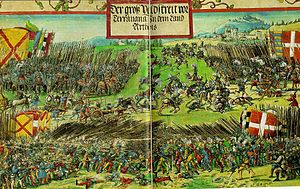Battle of the Spurs
| Battle of the Spurs | |||||||
|---|---|---|---|---|---|---|---|
| Part of the War of the League of Cambrai | |||||||
 Georg Lemberger, miniature for the triumph of the Emperor Maximilian I (1513–15) |
|||||||
|
|||||||
| Belligerents | |||||||
|
|
|
||||||
| Commanders and leaders | |||||||
|
Jacques de la Palice (POW) Charles, Duke of Alençon Louis, Duke of Longueville (POW) |
Henry VIII Henry Bourchier, 2nd Earl of Essex Maximilian I |
||||||
| Strength | |||||||
| 7,000 | 30,000 | ||||||
| Casualties and losses | |||||||
| Possibly 3,000 | Very light | ||||||
The Battle of the Spurs, or Battle of Guinegate, took place on 16 August 1513. As part of the Holy League, during the ongoing Italian Wars, English and Imperial troops under Henry VIII and Maximilian I surprised and routed a body of French cavalry under Jacques de La Palice. Henry and Maximilian were besieging the town of Thérouanne in Artois (now Pas-de-Calais). Henry's camp was at Guinegate, now called Enguinegatte. After Thérouanne fell, Henry VIII besieged and took Tournai.
Henry VIII had joined in the Holy League on 13 October 1511 with Venice and Spain to defend the Papacy from its enemies and France with military force. Henry promised to attack France at Guyenne, landing 10,000 men at Hondarribia in the Basque in June 1512. This army was conveyed by the admiral Edward Howard, and commanded by Thomas Grey, 2nd Marquess of Dorset. It remained at Bayonne till October 1512 supporting Ferdinand II of Aragon's action in the Kingdom of Navarre, though undersupplied and in poor morale. Maximilian joined the league in November 1512. Louis XII of France hoped that Scotland would aid France against England.
In May 1513 English soldiers began to arrive in number at Calais to join an army commanded by George Talbot, Earl of Shrewsbury, Lord Steward of the Household. Shrewsbury was appointed Lieutenant-General on 12 May, John Hopton commanded the troop ships. On 17 May Henry announced to the Cinque Ports and Edward Poynings, Constable of Dover Castle, that he would join the invasion in person, and had appointed commissioners to requisition all shipping. In Henry's absence across the sea (ad partes transmarinas), Catherine of Aragon would rule England and Wales as Rector and Governor (Rectrix et Gubernatrix).
...
Wikipedia
